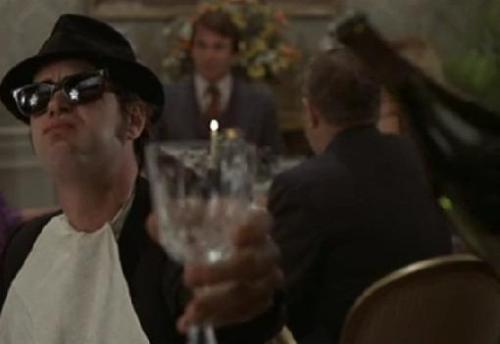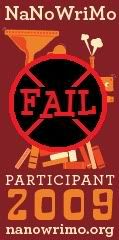Olive Garden and that’s as fancy as I get. And even then only on rare occasions.
The Olive Garden is alright, good food pleasant ambiance, all-in-all a pretty nice restaurant.
 And look at that, there seems to be a few choices of utensils here. Hmm, what to do, what to do. I’m not really one to be too concerned with high-class table manners when it comes to utensil etiquette, but at the same time I don’t want to embarrass myself over something obvious. Well, I’d say that the small fork is to be used for my salad and the big one is for the main course. Yes, that makes sense. And I bet that the wider of the two spoons is probably for soup, right? Ok, I can see that. The short knife is for buttering and the longer knife is probably for more intensive work. Good. Now, once you explain to me what the three different glasses are for, I think I’ll be good to go.
And look at that, there seems to be a few choices of utensils here. Hmm, what to do, what to do. I’m not really one to be too concerned with high-class table manners when it comes to utensil etiquette, but at the same time I don’t want to embarrass myself over something obvious. Well, I’d say that the small fork is to be used for my salad and the big one is for the main course. Yes, that makes sense. And I bet that the wider of the two spoons is probably for soup, right? Ok, I can see that. The short knife is for buttering and the longer knife is probably for more intensive work. Good. Now, once you explain to me what the three different glasses are for, I think I’ll be good to go.
I don’t feel too self-conscious about the fact that couldn’t tell you which side the spoon is supposed to be on or at which point in a multiple course meal the soup is supposed to come out (if soup is even included in such super-duper fancy dining experiences). I hear that white wine goes well with chicken and red wine goes well with beef, but this is about as far as my culinary knowledge goes about such things. I don’t care about these things because ultimately I know that they don’t matter. What matters is not the convoluted and complicated rules for putting food into your body that high-class snobs say you should follow. What ultimately matters is how good the food is.
This is the same stance I take on grammar and punctuation.
Grammar and punctuation have been the bane of my friggin’ existence for as long as I can remember. Rules about run-on sentences and commas and dashes vs. hyphens and gerunds and prepositions and ad infinitum. Then there I am, 12 years old, saying, “Yeah, but do I really need all that crap to write a story about a talking chicken?” “OH, YES!” says my English teacher, towering over me with ruler in hand. At this point in my education, I stopped wanting to write down the things I came up with and just left them in my head. To stick with the dining metaphor, if I couldn’t eat it all with my hands, I’d just go hungry.
For years I didn’t care about writing because it just made me feel stupid. With all of these rules to follow, it was like the story didn’t matter; what truly mattered was adherence to the rules and following the proper protocols. What do the rules have to do with a story that I made up in my head? I thought. So I decided that books and stories weren’t about the story at all, but making sure you kept your prose in line with what most considered to be linguistic law. It was something like an English Text Book sprouting limbs, waving a gun in my face and saying, “Alright, just do what I say and nobody gets hurt!”
Fuck English Class.
It was this firmly held belief that nearly caused me to fail English my senior year of High School.
 One day I was daydreaming (this just happens to be my default setting) and I had an idea about an interesting story. “Wouldn’t it be cool if…” As the days went by, it just stuck in my head and wouldn’t let go, like a booger that refuses to be flicked off your finger. I had no choice but to write the damn thing down, so it would be out of my head and on paper. I wrote it and forgot about it. I ended up picking it up a few weeks later and realized that it wasn’t half bad. The half that actually was bad was full of unclear wording and awkward sentences. Grudgingly, I admitted that I needed to brush up on my Proper English.
One day I was daydreaming (this just happens to be my default setting) and I had an idea about an interesting story. “Wouldn’t it be cool if…” As the days went by, it just stuck in my head and wouldn’t let go, like a booger that refuses to be flicked off your finger. I had no choice but to write the damn thing down, so it would be out of my head and on paper. I wrote it and forgot about it. I ended up picking it up a few weeks later and realized that it wasn’t half bad. The half that actually was bad was full of unclear wording and awkward sentences. Grudgingly, I admitted that I needed to brush up on my Proper English.
Never one to be a slave to any system, I promised myself that I wouldn’t become a Nazi about it and I picked up what I thought was important. The rest I left behind. In fact, I became so interested in writing that I actually took a college level “Intro to Writing” class with the University of Maryland. If you know me, then you know how much personal interest it would take me to do this. Education is completely different than knowledge and I was after the later.
The class was a joke. The entire semester could have been summarized in one day by saying, “PUT COMMAS EVERYWHERE!” What the professor thought was exceptional writing came off to me as just pretentious, uninspired crap. I did my homework every single day and managed to show up every single day as well. Further more, I actually paid to do this. The only day I didn’t show up to class was the one day everyone is supposed to go: the day of the final. I didn’t need to take the final exam. No one learns anything from a Final Exam that they haven’t already learned. A Final Exam is simply proof that you learned something. Coming from a college town, I know plenty of dolts with “proof” of learning in the form of a diploma. Pass.
The main lesson I walked away with was that there is no class that can teach you to be creative. Good writing doesn’t come from a slavish attachment to rules, it comes from an understanding of effective story telling. Sometimes to tell a better story, you have to deliberately break these rules.
Outside of trying to write something that’s at least a few steps above crap, I spend most of my time these days lurking about in the forums of a writer’s website called Editor Unleashed. Someone asked a question about grammar and punctuation within dialog. Someone else replied with the following:
When you’re a great writer or you think you’re a great writer, you no longer have to follow dialog punctuation. I’m reading Jose Saramago’s Blindness and he doesn’t use quotes. He also uses run-on sentences. He is a great writer and Nobel Prize winner, so he gets to do that.
Hold on, I thought, I have to win a Nobel Prize to use the grammar and punctuation I want? Oh fuck that!
When I serve someone up a story or an entry on this blog, I’m not overly concerned if the fork is on the right side, or the placement of any of the utensils for that matter. If I pour the wine into the water goblet and not the wine glass, consider the fact that maybe I meant to and run with it. If it comes time for dessert and I plop it down in the soup bowl, ask yourself why I would do that. Obviously if the food tastes funny, I’d like to know. Also, if I give you a bread knife to eat your soup with, I’d like to know that as well. If it was unintentional, I will apologize but don’t assume I don’t know what a spoon is.
In the end, I don’t really care about any of these things. All I want to know is one thing, did you enjoy your meal?
(By the way, I stripped my first few sentences down to their bare minimum punctuation. Go ahead grammar Nazis, point it out…I dare you!)

Recent Comments